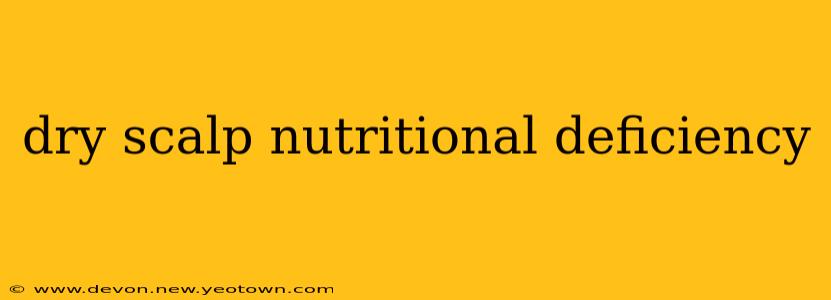A flaky, itchy scalp is a common problem, often attributed to dryness or dandruff. But did you know that nutritional deficiencies can also play a significant role? Imagine this: you're scratching your head constantly, feeling self-conscious about those unsightly flakes, and nothing seems to work. Before resorting to harsh chemical treatments, let's explore the fascinating connection between your diet and the health of your scalp. This isn't just about superficial beauty; a healthy scalp is a reflection of overall well-being. This detailed exploration will delve into the potential nutritional deficiencies behind dry scalp and how addressing them can lead to lasting relief.
What are the common nutritional deficiencies linked to dry scalp?
Several nutritional deficiencies can manifest as a dry, itchy scalp. The most common culprits are often deficiencies in essential fatty acids, zinc, iron, and vitamin B. Let's break down each one individually.
Essential Fatty Acids (EFAs): The Unsung Heroes of Healthy Skin
EFAs, like omega-3 and omega-6 fatty acids, are crucial for maintaining the skin's barrier function. They help keep your scalp hydrated, preventing dryness and flakiness. Think of them as the natural moisturizers your body produces. A deficiency in these vital fats can lead to a compromised skin barrier, resulting in dry, irritated skin, including your scalp.
Zinc: The Master Mineral for Skin Repair
Zinc plays a pivotal role in cell growth and repair, including the repair of damaged skin cells on your scalp. A zinc deficiency can impair this process, leading to slower healing and a greater susceptibility to dryness and irritation. It's involved in numerous physiological processes relating to skin health.
Iron: Oxygen's Delivery Driver for Healthy Scalp Cells
Iron is essential for carrying oxygen throughout your body, including your scalp. Without sufficient iron, your scalp cells may not receive the oxygen they need to function optimally, contributing to dryness and potentially leading to hair loss. The connection between iron and scalp health is often overlooked.
Vitamin B Complex: Multi-Taskers for Scalp Health
The B vitamins, particularly biotin (B7), niacin (B3), and riboflavin (B2), are critical for cell growth and metabolism. A deficiency in any of these can negatively impact cell turnover and the overall health of your scalp. Biotin, in particular, is frequently touted for its role in hair growth, but it also contributes to healthy scalp skin.
How do I know if I have a nutritional deficiency?
Identifying a nutritional deficiency often requires a professional assessment. While some symptoms are obvious, a dry scalp alone shouldn't be taken as definitive proof of deficiency. However, if you experience persistent dry scalp alongside other symptoms, such as fatigue, brittle nails, hair loss, or pale skin, it's best to consult a doctor or registered dietitian. They can conduct appropriate tests to determine if a deficiency is present.
Can supplements help with dry scalp caused by nutritional deficiencies?
Supplements can be beneficial if a deficiency is identified by a healthcare professional. Self-treating with supplements without a proper diagnosis can be risky, as excessive intake of certain vitamins and minerals can have negative consequences. Your doctor or dietitian can recommend appropriate supplements and dosages based on your individual needs and health status. Remember, a balanced diet is always the primary approach.
What other factors contribute to dry scalp?
While nutritional deficiencies can contribute significantly, other factors can also influence scalp dryness, including:
- Harsh shampoos and styling products: Chemical-laden products can strip your scalp of its natural oils.
- Environmental factors: Cold, dry air and excessive sun exposure can exacerbate dryness.
- Underlying medical conditions: Certain skin conditions like eczema or psoriasis can manifest as dry, itchy scalp.
- Stress: Stress can disrupt the body's natural balance and potentially worsen scalp dryness.
How can I improve my scalp health holistically?
Beyond addressing potential nutritional deficiencies, consider adopting a holistic approach to scalp health:
- Gentle cleansing: Use mild, sulfate-free shampoos and conditioners.
- Hydration: Drink plenty of water to stay hydrated from the inside out.
- Healthy diet: Focus on a balanced diet rich in fruits, vegetables, whole grains, and lean protein.
- Stress management: Practice stress-reducing techniques like meditation or yoga.
- Consult a professional: Seek advice from a dermatologist or trichologist if your scalp dryness is persistent or severe.
By understanding the potential link between nutritional deficiencies and dry scalp, and by taking proactive steps to address these deficiencies and adopt healthy habits, you can pave the way for a healthier, happier, and flake-free scalp. Remember, your scalp's health is a reflection of your overall well-being.

